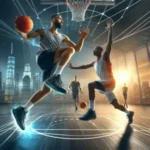In the world of basketball, the center position is often regarded as the heart of the team, where strength, agility, and strategic thinking come together to dominate the game.
For aspiring athletes looking to excel in this pivotal role, mastering the key skills is not just an option; it’s a necessity. From honing your footwork and developing a commanding presence in the paint to perfecting your shot-blocking techniques and enhancing your passing abilities, the journey to becoming an elite basketball center demands dedication, discipline, and a keen understanding of the game’s intricacies. In this blog post, we will explore the essential skills every aspiring center must cultivate, offer practical training tips, and provide insights from seasoned professionals to help you elevate your game. Whether you’re a young player eager to make your mark or a seasoned athlete aiming to refine your craft, this comprehensive guide will set you on the path to becoming a dominant force on the court.
1. Understanding the Role of a Basketball Center
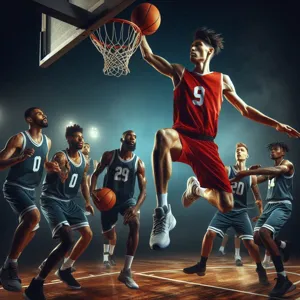
Becoming an elite basketball center demands a deep understanding of the role itself—an intricate blend of physical prowess, tactical awareness, and leadership on the court. The center is often the focal point of a team’s defense and offense, tasked with responsibilities that extend far beyond simply scoring points.
At the offensive end, a center typically occupies the low post, using a combination of size and agility to create scoring opportunities. This position requires exceptional footwork and a variety of scoring techniques, from hook shots and layups to powerful dunks. Moreover, a skilled center must be adept at setting solid screens to create space for teammates, facilitating a fluid offensive flow.
Defensively, the center acts as the anchor of the team, responsible for protecting the rim and contesting shots. This role demands not only physical strength and conditioning but also sharp instincts to anticipate opponents’ moves. A great center understands the importance of positioning, knowing when to switch on screens and when to help teammates in the paint.
In addition to these physical skills, a successful center must possess strong communication abilities. They must orchestrate defensive schemes, calling out assignments and helping to direct the team’s movements. Leadership on and off the court is crucial, as centers often serve as role models for teammates, inspiring them with their work ethic and dedication.
Ultimately, mastering the role of a basketball center involves a holistic approach—balancing technical skills with game intelligence and interpersonal dynamics. By fully understanding the multifaceted responsibilities of this position, aspiring centers can begin their journey toward elite status in the world of basketball.
2. Essential Physical Skills for Centers
To excel as an elite basketball center, mastering essential physical skills is paramount. Centers play a crucial role on the court, often serving as the backbone of both the offense and defense. Here are the key physical skills that every aspiring center should focus on to elevate their game:
**1. Heightened Rebounding Ability:**
Rebounding is a fundamental aspect of the center’s role. A successful center must develop a keen sense of timing and positioning to dominate the boards. This involves not only jumping ability but also the strength to box out opponents effectively. Practicing vertical leaps and developing core strength through targeted exercises will enhance your ability to secure both offensive and defensive rebounds.
**2. Strong Post Moves:**
A skilled center should possess a diverse arsenal of post moves to score efficiently in the paint. Mastering techniques such as drop steps, hook shots, and up-and-under moves can make a center a formidable offensive threat. Drilling these moves in practice will build muscle memory, enabling you to execute them seamlessly during games, even against tough defenders.
**3. Physical Conditioning:**
A center must maintain top physical conditioning to endure the rigors of the game. This means not only building strength but also enhancing endurance and agility. Incorporating cardio workouts, strength training, and flexibility exercises into your routine will help you stay agile on the court and maintain high energy levels throughout the game.
**4. Defensive Presence:**
A dominant center must also be a defensive powerhouse. This entails developing lateral quickness to guard against quicker players and the strength to contest shots effectively. Practicing defensive drills that focus on footwork and reaction time will prepare you to protect the rim and alter opponents’ shots, becoming a key defensive asset.
**5. Coordination and Balance:**
Finally, a center’s success often hinges on their coordination and balance. Whether securing a rebound or executing a post move, maintaining balance under pressure is vital. Engaging in drills that emphasize footwork and body control will enhance your overall coordination, enabling you to perform at your best in high-pressure situations.
In summary, focusing on these essential physical skills will not only set you apart as a center but also lay the foundation for a successful basketball career. Embrace the grind, put in the work, and watch as your skills transform you into an elite player on the court.
3. Developing Footwork and Agility
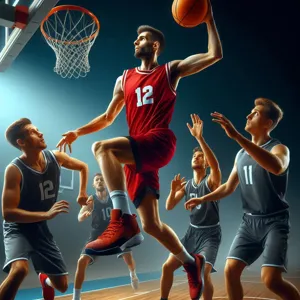
Footwork and agility are essential skills for any elite basketball center, serving as the foundation for both offensive and defensive play. As the backbone of your team’s interior presence, mastering these elements can elevate your game and set you apart from the competition.
First and foremost, effective footwork enables you to establish a dominant position in the paint. Centers often find themselves in intense one-on-one battles under the basket, where quick pivots and precise foot placement can mean the difference between scoring and being blocked. Practicing drills that emphasize lateral movement, such as cone drills or agility ladders, can significantly enhance your foot speed and coordination. These exercises not only improve your ability to navigate tight spaces but also help you react swiftly to your opponent’s movements.
Moreover, agility is crucial for both offensive maneuvers and defensive strategies. As a center, you often need to execute swift cuts to receive passes or create space for a shot. Incorporating plyometric exercises, like box jumps or lateral hops, into your training routine can boost your explosive power, allowing you to elevate quickly for rebounds or dunks. Agility also plays a vital role in defense, as you must swiftly adjust your positioning to contest shots or guard against drives to the basket.
Incorporating drills that simulate game scenarios—such as practicing drop steps, spin moves, and defensive slides—will help you hone your footwork in a realistic context. Additionally, working with a coach or trainer can provide invaluable feedback on your technique, ensuring that your movements are both efficient and effective.
Ultimately, dedicating time and effort to developing your footwork and agility will not only enhance your performance as a basketball center but also instill a sense of confidence as you dominate the court. Whether you’re scoring, rebounding, or locking down your opponent, your footwork will be the unsung hero of your game.
4. Mastering Post Moves and Scoring Techniques
Mastering post moves and scoring techniques is essential for any aspiring elite basketball center. This pivotal role on the court demands a unique blend of strength, agility, and finesse, allowing players to dominate in the paint and convert scoring opportunities.
To effectively master post moves, you must first understand the fundamentals. Begin with your footwork—practice pivoting and jab steps to create separation from defenders. Drills that emphasize quick, explosive movements will help you develop the necessary agility to maneuver around opponents. One effective drill is the “drop step,” which utilizes your body’s momentum to gain an advantageous angle toward the basket. Pair this with a strong finishing touch, whether it’s a layup or a powerful dunk, to capitalize on your positioning.
Additionally, mastering various scoring techniques—such as hook shots, bank shots, and jump hooks—will give you a versatile scoring arsenal. The hook shot, in particular, is a staple for centers because it allows you to score over taller defenders while minimizing the risk of a block. Practice shooting off both hands to become unpredictable and difficult to defend.
Incorporate video analysis into your training routine. By watching footage of elite centers like Kareem Abdul-Jabbar or Hakeem Olajuwon, you can glean valuable insights into their techniques, footwork, and decision-making processes. Pay attention to how they create space and use body positioning to set up their shots.
Finally, don’t underestimate the power of a strong mental game. Developing a basketball IQ that allows you to read defenses and anticipate plays is crucial. Engage in scenario-based drills that simulate game situations to hone your decision-making skills under pressure.
By dedicating time to mastering post moves and scoring techniques, you’ll establish yourself as a formidable presence on the court, capable of dominating the game and leading your team to victory.
5. The Importance of Rebounding Skills
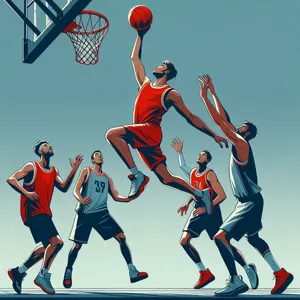
Rebounding skills are a fundamental pillar for any elite basketball center, playing a crucial role not only in individual performance but also in the overall success of the team. A center’s ability to secure rebounds can dramatically shift the momentum of a game, providing valuable possessions and denying the opposing team crucial scoring opportunities.
To master rebounding, one must develop a keen sense of timing, positioning, and physicality. It begins with understanding the trajectory of the ball—anticipating where a missed shot is likely to land based on the angle and distance of the shot taken. This requires both mental acuity and spatial awareness. An elite center must train themselves to read the shooter and quickly gauge how the ball will bounce off the rim or backboard.
Positioning is equally important. A great center knows how to establish and maintain a dominant position near the basket, utilizing their body to shield opponents and create space for themselves. This often involves strategic footwork, leveraging strength, and a deep understanding of the game’s flow.
Moreover, rebounding is not just a solo effort; it involves teamwork. Communicating with teammates about boxing out and making sure everyone is aware of their roles during a rebound attempt is essential. A coordinated effort can often lead to securing a rebound even against multiple defenders.
Lastly, the physical aspect cannot be overlooked. Elite centers must maintain peak conditioning, strength, and agility to effectively battle for boards against opposing players who are equally determined. Regular strength training and agility drills can greatly enhance a center’s rebounding prowess, allowing them to leap higher and box out more effectively.
In essence, rebounding skills can elevate a center from being just another big player on the court to becoming a game-changer. By dedicating time and effort to refining these skills, aspiring elite basketball centers can ensure they have a significant impact on their team’s performance, contributing to victories and securing their legacy in the sport.
6. Defensive Strategies for Dominating the Paint
Defensive strategies are crucial for a basketball center aspiring to dominate the paint. As the backbone of the defense, centers must possess a keen understanding of positioning, timing, and physicality to effectively guard the rim and disrupt opponents’ offensive plays.
First and foremost, mastering body positioning is essential. A center should always maintain a low, athletic stance, ready to pivot and react to the offensive player’s movements. By keeping their hips low and feet shoulder-width apart, a center can effectively establish a strong base that allows for quick lateral movements. This positioning not only helps in defending against drives but also prepares them for potential rebounds.
Another key aspect is learning to read the offensive player’s body language. Recognizing subtle cues can give a center the upper hand. Are they preparing to drive, pull up for a jumper, or kick the ball out to a teammate? Anticipating these moves can help a center position themselves effectively, either to contest a shot or to cut off a driving lane.
Moreover, practicing effective shot-blocking techniques is vital. Timing is everything; a well-timed jump can intimidate opponents and alter their shot. Centers should focus on elevating straight up rather than swatting down, as this minimizes the risk of fouling. Additionally, developing a quick reaction to the ball’s trajectory can make the difference between a blocked shot and an easy basket for the opponent.
Communication is another cornerstone of defensive prowess. A center must not only focus on their individual assignments but also be vocal on the court, directing teammates to switch, help, or collapse on driving players. This ensures that the entire defensive unit operates cohesively, making it more challenging for opponents to find open looks.
Lastly, conditioning cannot be overlooked. The demands of the paint require a center to be agile and strong, able to battle for position and recover quickly. Incorporating strength and agility drills into training routines will enhance a center’s ability to hold their ground against other bigs while maintaining the stamina needed to stay effective throughout the game.
By honing these defensive strategies, a basketball center can become a formidable presence in the paint, not just protecting the basket but also instilling a sense of confidence in their team’s overall defensive efforts. With dedication and practice, any aspiring elite center can elevate their game and dominate the court defensively.
7. Communication and Leadership on the Court
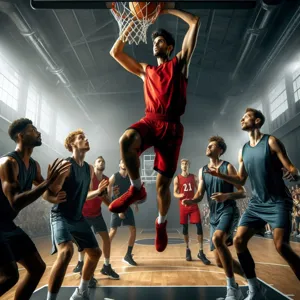
Effective communication and leadership are indispensable skills for any elite basketball center. As the anchor of the team, you are not just a key player on the court but also a pivotal figure in facilitating teamwork and strategy execution. Your ability to communicate clearly and assertively can make all the difference in a high-pressure game, where split-second decisions are often the difference between victory and defeat.
First and foremost, mastering verbal communication is essential. This includes calling out plays, directing teammates during offensive and defensive sets, and providing real-time feedback. A confident shout of “screen left!” or “box out!” can guide your teammates into position, enhancing coordination and minimizing confusion. But communication isn’t solely about speaking; it’s also about listening. Being attuned to your teammates’ calls and adjusting to their cues can improve your synergy on the court, leading to more cohesive and fluid gameplay.
Non-verbal communication is equally crucial. A simple nod, a pointed finger, or a determined stare can convey your intentions and rally your team without uttering a word. Understanding body language helps you gauge your teammates’ confidence and readiness, allowing you to adjust your leadership approach accordingly. Moreover, maintaining eye contact during huddles can foster trust and solidarity, reinforcing your role as a leader.
Leadership on the court goes beyond mere communication; it involves inspiring and motivating your teammates. As a center, your performance sets the tone for the game. Demonstrating resilience in the face of adversity, celebrating your teammates’ successes, and maintaining a positive attitude can galvanize the entire team. Remember, true leaders lead by example—whether it’s diving for a loose ball, hustling back on defense, or encouraging a teammate after a tough play, your actions will resonate with those around you.
Finally, effective leaders also cultivate a supportive environment where every player feels valued. Encourage open dialogue, celebrate individual strengths, and provide constructive feedback. By fostering a culture of trust and respect, you empower your teammates to perform at their best, creating a unified front that can tackle any challenge that comes your way. In the fast-paced world of basketball, the ability to lead and communicate effectively can transform an average team into a championship contender.
8. Improving Basketball IQ: Reading the Game
Improving your basketball IQ is a vital component on the journey to becoming an elite center. It goes beyond mere physical prowess and technical skills; it involves developing a deep understanding of the game and its nuances. A high basketball IQ enables you to anticipate plays, read defenses, and make smarter decisions on the court, ultimately elevating your performance and that of your team.
To enhance your basketball IQ, start by immersing yourself in the game. Watch film—both professional and your own practice sessions. Analyze the movements of successful centers in the league; observe how they position themselves on offense and defense, their decision-making in critical moments, and how they communicate with teammates. Look for patterns in how plays develop and how defenses react, which will help you recognize similar situations when they arise in your games.
Additionally, engage in conversations with coaches and experienced players. Their insights can provide invaluable perspectives on strategies, positioning, and game dynamics. Ask questions about specific plays, defensive sets, or offensive strategies to deepen your understanding of the game.
Another effective way to improve your basketball IQ is through simulation. Participate in scrimmages and practice scenarios where you must make quick decisions in real-time. The more you expose yourself to game-like situations, the better you will become at recognizing opportunities and threats on the court.
Finally, remember that improving your basketball IQ is an ongoing process. Stay curious and committed to learning; read books on basketball strategy, attend clinics, and analyze different styles of play. By continuously seeking knowledge and applying it on the court, you’ll transform your game, making you not just a player, but a strategic force to be reckoned with as an elite basketball center.
9. Training Regimens for Aspiring Centers
When it comes to becoming an elite basketball center, a well-structured training regimen is essential for developing the skills and physical attributes needed to dominate the court. Centers stand at the heart of the action, often tasked with rebounding, shot-blocking, and scoring in the paint. Therefore, a training program must be comprehensive, focusing on strength, agility, and technical skills.
**Strength Training**
To command the paint, aspiring centers must cultivate a solid foundation of strength. Incorporating exercises like squats, deadlifts, and bench presses into your routine will build the muscle mass necessary for battling opponents in the post. Additionally, core stability exercises such as planks and medicine ball rotations will enhance your balance and power, allowing you to hold your ground against much larger players.
**Agility Drills**
While height and strength are critical, agility is often the differentiator between good centers and great ones. Incorporate agility drills, such as ladder workouts and cone sprints, to improve foot speed and lateral movement. This will not only help you navigate the court with ease but will also allow you to defend against quicker opponents more effectively.
**Skill Development**
Technical skills are paramount for a center aiming to excel. Dedicate time to perfecting your footwork in the post, working on drop steps, spin moves, and up-and-under techniques. Partner with guards to improve your pick-and-roll mechanics and develop your ability to catch and finish around the rim. Additionally, practicing your shooting touch, particularly in the mid-range and free-throw areas, will make you a more versatile threat on the offensive end.
**Conditioning**
Basketball requires endurance, and centers are often tasked with playing significant minutes. Incorporate cardiovascular conditioning into your training regimen through activities such as interval sprints, cycling, or swimming. This will not only improve your stamina but will also enhance your recovery between plays, allowing you to maintain high energy levels throughout the game.
**Mental Preparation**
Lastly, don’t overlook the mental aspect of training. Visualization techniques can be powerful tools for performance enhancement. Spend time imagining yourself executing plays successfully, whether it’s grabbing a rebound, blocking a shot, or finishing strong at the rim. Moreover, studying game film can provide valuable insights into positioning and decision-making, enabling you to anticipate opponents’ moves and react more effectively on the court.
Incorporating these elements into your training regimen will set a solid foundation for your development as a center. With consistency, dedication, and a willingness to adapt, you’ll be well on your way to mastering the skills necessary to thrive in the competitive world of basketball.
10. The Role of Nutrition and Recovery in Performance
When it comes to becoming an elite basketball center, the importance of nutrition and recovery cannot be overstated. These two elements are the unsung heroes behind every standout performance on the court. As a center, you are not only expected to dominate the paint with your physical prowess but also maintain the stamina to endure high-pressure situations throughout the game.
Nutrition serves as the foundation for your performance. The right balance of macronutrients—carbohydrates, proteins, and fats—fuels your muscles and keeps your energy levels high. A diet rich in lean proteins, whole grains, fruits, and vegetables not only enhances your strength but also supports muscle recovery after intense training sessions. Hydration plays a crucial role as well; staying properly hydrated helps maintain peak physical performance and prevents fatigue. Consider working with a nutritionist to tailor a meal plan that aligns with your training regimen and energy needs.
Equally important is the emphasis on recovery. After grueling practices and games, your body requires time to heal and rebuild. Incorporating rest days into your training schedule is essential, as it allows your muscles to recuperate and grow stronger. Techniques such as stretching, foam rolling, and massage therapy can help alleviate soreness and improve flexibility, reducing the risk of injury. Moreover, innovative recovery tools like cryotherapy, compression garments, and even contrast baths can enhance circulation and expedite the healing process.
In a sport as demanding as basketball, neglecting nutrition and recovery can lead to burnout and injuries, ultimately hindering your performance. By prioritizing these aspects, you not only enhance your ability to perform at your best but also extend your career on the court. Remember, the journey to becoming an elite center is not just about skill development; it’s also about treating your body with the care it deserves, ensuring you remain a formidable presence in the game for years to come.
11. Analyzing Elite Centers: Learning from the Best
To truly master the art of playing as a basketball center, one of the most effective strategies is to analyze the techniques and habits of elite centers in the game. This involves diving deep into the playing styles of well-known players who have made their mark on the court, such as Shaquille O’Neal, Kareem Abdul-Jabbar, or current stars like Joel Embiid and Nikola Jokić. Each of these athletes has unique attributes and skills, but they also share foundational practices that aspiring centers can learn from.
Start by studying their footwork. Elite centers possess an extraordinary ability to maneuver in the paint, using a combination of agility and strength to position themselves effectively. Take note of how they pivot, set screens, and create space for scoring opportunities. Analyzing game footage can reveal the subtleties of their movements and decision-making processes, showing you how to maintain balance and control while under pressure.
Next, focus on their scoring techniques. Notice how they utilize a variety of shots—hook shots, layups, and jumpers—to keep defenders guessing. Watch for their ability to read the defense and adapt their strategy accordingly. Elite centers are not only efficient scorers but also skilled passers. Observe their court vision and how they involve teammates, creating a dynamic offense that keeps opponents on their toes.
Defensive prowess is another critical aspect to analyze. How do these players position themselves to block shots or contest drives? What strategies do they employ to secure rebounds? Understanding their defensive mindset will help you develop your own skills in protecting the rim and controlling the boards.
Lastly, consider the mental aspect of the game. Elite centers maintain a competitive edge by staying focused and composed, even in high-pressure situations. Pay attention to their demeanor on the court and how they handle adversity. Developing mental resilience is just as crucial as physical skill, and learning from the greats can provide valuable insights into building this essential trait.
Analyzing elite centers isn’t just about emulating their style; it’s about understanding the principles that underpin their success. By studying their gameplay, you can cultivate your skills and elevate your performance, ultimately taking your game to the next level. Whether through watching games, analyzing stats, or even seeking mentorship from seasoned players, immersing yourself in the world of elite centers will equip you with the knowledge and inspiration needed to excel on the court.
12. Building Mental Toughness and Confidence
Building mental toughness and confidence is an essential aspect of becoming an elite basketball center. The game of basketball is as much a mental challenge as it is a physical one. To dominate the paint, you must possess an unwavering mindset that allows you to thrive under pressure and overcome adversity.
Mental toughness begins with self-belief. As a center, you will face formidable opponents, intense competition, and high-stakes situations. Cultivating confidence in your abilities can make all the difference when the game is on the line. Visualization techniques can be powerful tools in this regard. Picture yourself executing flawless plays, grabbing rebounds, and blocking shots. By mentally rehearsing success, you lay the groundwork for real-life achievements on the court.
Additionally, embracing a growth mindset is crucial. Understand that setbacks and failures are natural parts of the journey. Instead of allowing mistakes to linger in your mind, view them as opportunities for growth. Analyze what went wrong, learn from it, and move forward with increased determination. This resilience not only enhances your performance but also inspires those around you, fostering a positive team environment.
Moreover, establishing a strong routine can fortify your mental game. Whether it’s a pre-game ritual, a series of warm-up exercises, or a specific breathing technique to calm your nerves, consistency breeds confidence. The more you prepare mentally and physically, the more poised you will feel when it’s time to compete.
Lastly, surround yourself with supportive teammates and coaches who uplift and encourage you. A positive support system can significantly bolster your confidence, reminding you of your strengths and capabilities. With mental toughness and self-assurance as your foundation, you’ll be well-equipped to face any challenge that comes your way, solidifying your status as an elite basketball center.
13. Importance of Teamwork and Collaboration
In the world of basketball, the spotlight often shines on individual talent, showcasing dazzling dribbles and impressive dunks. However, the essence of a successful team lies in the synergy created through teamwork and collaboration. As an elite basketball center, your role transcends personal achievement; it demands a commitment to fostering a cohesive unit where every player’s strengths are utilized to their fullest potential.
Teamwork in basketball is akin to the intricate gears of a well-oiled machine. Each player, regardless of their position, contributes to the team’s overall performance. For a center, this means not only dominating the paint but also establishing chemistry with guards and forwards. Effective communication is crucial—sharing insights, calling plays, and offering encouragement can dramatically enhance the fluidity of the game. By actively listening to teammates and understanding their playing styles, you can anticipate their needs on the court, leading to seamless transitions and increased scoring opportunities.
Collaboration extends beyond mere on-court dynamics; it involves building trust and camaraderie off the court as well. Engaging in team-building activities, whether it’s a casual dinner or a rigorous training camp, fosters relationships that translate into better understanding during high-pressure situations. When players know each other well, they can read one another’s movements and make split-second decisions that can turn the tide of a game.
Furthermore, embracing a collaborative mindset involves being receptive to feedback and willing to adjust your playstyle for the benefit of the team. An elite center recognizes that their success is intertwined with the success of their teammates. This means setting screens, boxing out opponents, and creating space—all essential actions that may not always lead to personal glory but are vital for the team’s triumph.
Ultimately, the importance of teamwork and collaboration cannot be overstated in basketball. By prioritizing these elements, centers can elevate not only their game but also the performance of their entire team, fostering an environment where everyone thrives and victories become a shared achievement. In this intricate dance of strategy, communication, and trust, you’ll find that the true beauty of basketball lies in its collective spirit.
14. Setting Goals and Tracking Progress
Setting goals and tracking progress are pivotal components in the journey to becoming an elite basketball center. As you step onto the court, it’s essential to have a clear vision of what you want to achieve, whether it’s improving your scoring average, enhancing your rebounding skills, or mastering defensive maneuvers. These aspirations should be specific, measurable, achievable, relevant, and time-bound (SMART). For instance, instead of simply saying, “I want to be a better scorer,” set a concrete goal like, “I want to increase my field goal percentage by 10% over the next three months.”
once your goals are defined, tracking your progress becomes crucial. This can be done through various methods, such as maintaining a dedicated training journal or using mobile apps designed for athletes. Documenting your daily workouts, game performances, and any feedback from coaches allows you to see patterns in your development. Are you consistently hitting your targets? Are certain skills improving faster than others? This reflection not only boosts motivation but also helps in identifying areas needing more focus.
Additionally, consider setting short-term milestones that lead to your long-term goals. Celebrate these small victories to keep your morale high. For example, if you aim to improve your free-throw percentage, breaking it down into weekly shooting drills and tracking your success after each session can provide immediate feedback and encouragement.
Finally, don’t hesitate to share your goals with coaches or teammates. This accountability can serve as a powerful motivator, pushing you to stay committed to your development. By systematically setting goals and tracking your progress, you’ll not only refine your skills as a basketball center but also cultivate a winning mindset that can propel you to elite status on and off the court.
15. Resources for Continuous Improvement and Learning
To truly excel as an elite basketball center, embracing a mindset of continuous improvement is essential. The journey to mastery doesn’t end after a few training sessions or a successful season; it’s an ongoing process that requires dedication and a thirst for knowledge. Fortunately, there are a wealth of resources available to help you refine your skills and broaden your understanding of the game.
**Books and Biographies**: Start by diving into the extensive library of basketball literature. Books like “The Basketball Handbook” and “The Art of a Beautiful Game” provide foundational knowledge and advanced techniques that can enhance your skill set. Biographies of legendary centers such as Shaquille O’Neal, Kareem Abdul-Jabbar, and Bill Russell offer invaluable insights into their training regimens, mental approaches, and the challenges they faced on their paths to greatness.
**Online Courses and Tutorials**: Platforms like Udemy and MasterClass offer courses taught by professional players and coaches. These structured lessons often include video demonstrations, drills, and expert tips tailored specifically for centers. Whether it’s refining your footwork, improving your post moves, or mastering defensive strategies, these resources can be immensely beneficial.
**Training Camps and Clinics**: Participating in basketball camps and clinics is another excellent way to improve your skills. These events provide hands-on training with experienced coaches and the opportunity to practice alongside peers who share your passion. Look for camps that focus on specific aspects of your game, such as rebounding techniques or shot-blocking drills, to get the most out of your experience.
**Podcasts and Webinars**: The digital age has made it easier than ever to access knowledge. There are numerous basketball podcasts and webinars hosted by coaches, analysts, and former players discussing everything from game strategy to personal development. Tune in during your commute or workout sessions to absorb tips and advice that can enhance your gameplay.
**Video Analysis**: Take advantage of technology by recording your practices and games. Reviewing your performance allows you to identify areas of strength and those needing improvement. Additionally, watching game footage of elite centers can provide you with valuable insights into their techniques and decision-making processes on the court.
**Community Engagement**: Finally, don’t underestimate the power of community. Join online forums or local basketball clubs where you can connect with fellow players and coaches. Sharing experiences, discussing challenges, and seeking advice from others can provide fresh perspectives and motivate you to keep pushing your limits.
By leveraging these diverse resources for continuous improvement, you’ll not only enhance your technical skills but also develop a deeper understanding of the game. This commitment to learning is what sets elite basketball centers apart and drives them toward sustained excellence on the court.
In conclusion, becoming an elite basketball center requires a blend of dedication, skill, and a strategic approach to both practice and gameplay. By mastering the key skills we’ve outlined—such as footwork, rebounding, offensive post moves, and defensive positioning—you’ll set yourself apart on the court. Remember, the journey to excellence is a continuous process of learning and adapting, so embrace the challenges and celebrate your progress along the way. Whether you’re just starting out or looking to refine your veteran skills, the commitment to improvement will not only enhance your performance but also elevate your entire team. Now, lace up those sneakers, hit the court, and start putting these skills into action; greatness awaits!





